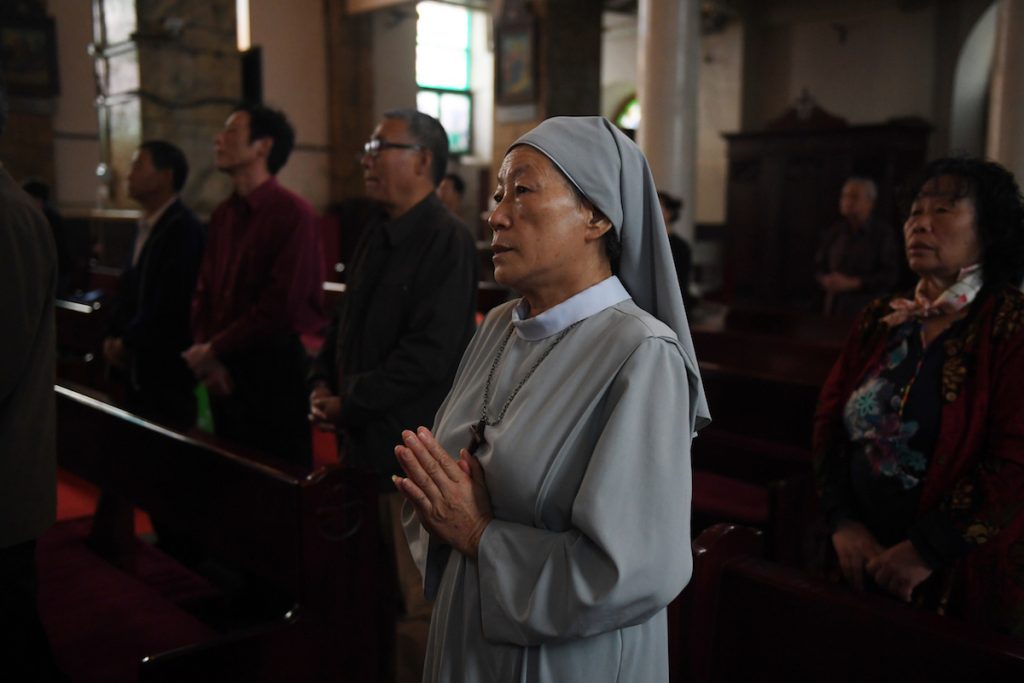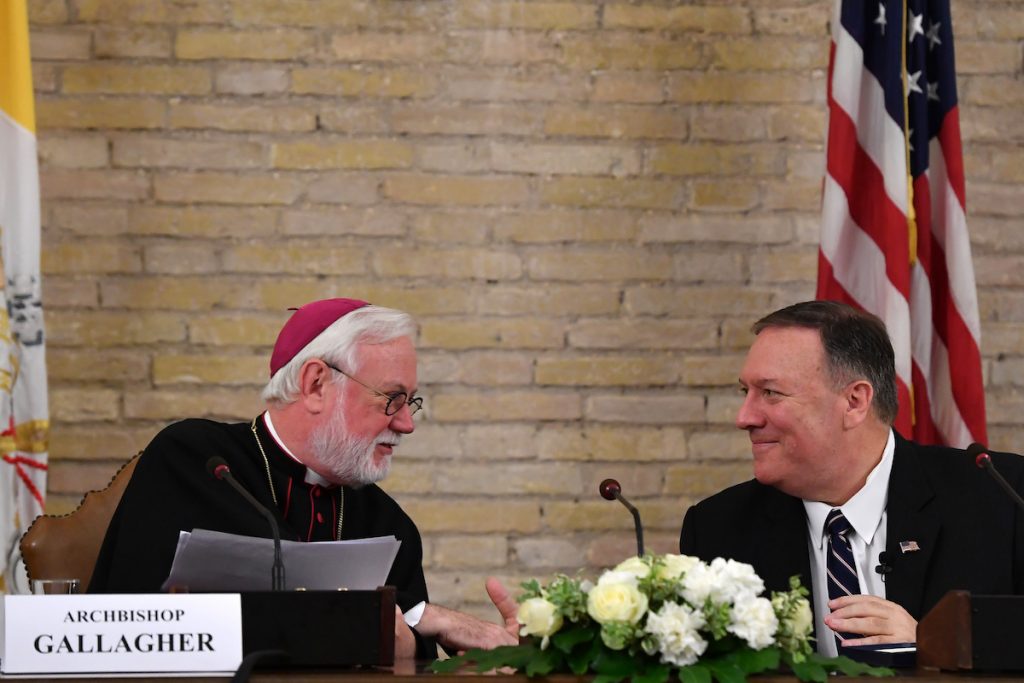A top Vatican diplomat has defended the renewal of a controversial deal with Beijing, saying that concrete progress has been made regarding the appointment of bishops in China.
Archbishop Paul Gallagher, who is the Vatican’s secretary for relations with states, told Catholic media Crux earlier this week that if Beijing had not been granted a significant role in choosing bishops then very little progress would have been made in the matter.
“We would have found ourselves — not immediately, but ten years down the line — with very few bishops, if any, still in communion with the pope,” Archbishop Gallagher said.
“If we don’t begin now, that’s the future,” he said.
The interim deal was signed in China on Sept. 22, 2018 and its details remain secret, but as part of it, Pope Francis has officially recognized eight bishops (one of whom died earlier in 2017) named by the Chinese state that did not have papal approval.
Supporters of the deal hope it will help unify and ultimately protect China’s 10-12 million-strong Catholic community that was split in two after the communists created the Chinese Patriotic Catholic Association in 1957.
In the Crux interview Archbishop Gallagher confirmed the Vatican has proposed a two-year extension of the deal. He added that Beijing has not yet responded and that if no answer is received by month’s end, then the deal expires.
But the British archbishop said there were no indications that Beijing would not renew the agreement.
Last month China’s Foreign Ministry spokesman Zhao Lijian indicated that Beijing was also eager to renew, saying “the two sides will continue to maintain close communication and consultation and improve bilateral relations.”
Archbishop Gallagher said that it was “desirable” for the accord to eventually be made permanent.
The 66-year-old archbishop agreed that the deal’s implementation has not been smooth, telling Crux that one reason the Vatican proposed a two-year renewal for now is because, “We’re not 99 percent happy about things, we have lots of reservations and lots of things haven’t worked out the way we hoped.”
Archbishop Gallagher’s interview follows growing media attention and criticism over the deal, including from within the Church, most notably by Cardinal Joseph Zen, emeritus bishop of Hong Kong. In February, Cardinal Zen warned that the underground Church in China, which has sworn its allegiance to the Holy See, is “doomed to disappear,” something he said was being facilitated by the Beijing-Vatican accord.


Despite such criticism, Archbishop Gallagher insisted that there actually are concrete results.
“The fact we have managed to get all the bishops of China in communion with the Holy Father for the first time since the 1950s, and that the Chinese authorities allow the pope a modest say in the appointment of bishops but ultimately the final word, is quite remarkable,” he told Crux.
“We’re not blowing it up beyond what it is, but as Cardinal [Pietro] Parolin has often said, it’s a little tiny glimmer of an opening, a window,” he said, referring to the Vatican’s Secretary of State.
“In English, we’d probably say it’s getting your toe in the door,” Archbishop Gallagher said.
Critics have further pointed out that since the signing of the agreement that the Vatican has been publicly silent over the Chinese state’s crackdown on Christians and other faith groups, most notably Muslim Uyghurs in the Xinjiang region.
Since the signing of the accord, Chinese authorities have continued to remove crosses and demolish church buildings in different regions in China. So-called “underground Catholics” and members of the clergy also reported continued harassment and detention.
The Vatican’s silence over Beijing’s crackdown on freedoms in Hong Kong has also been noted.
One of the most recent high profile critics of the Vatican-China deal has been U.S. Secretary of State Mike Pompeo who said in a Sept. 20 tweet that: “The Vatican endangers its moral authority, should it renew the deal.”


Despite this, Archbishop Gallagher told Crux: “We think it’s worth accepting the criticism,” while adding, “I can understand the criticism.”
The archbishop said that the Vatican, as a small state with no diplomatic relations with the People’s Republic of China and no other cards to play, has to find a way to stay engaged.
“Large states, influential states, have many instruments they can use in relations with China to try to get their point of view over or to make demands,” he said, “[such as] commercial and financial [tools], sometimes strategic and military.”
“The Holy See has nothing of that. All we have is dialogue,” he said.
Archbishop Gallagher also said that without the provisional accord, there would be no communication channels with China’s leadership.
“It does mean that we have an opportunity to raise other issues with our Chinese counterparts,” he said. “If we were to walk away from the dialogue completely, we wouldn’t have any opportunity for that. We don’t have a diplomatic mission in Beijing. We have representation in Hong Kong, but that’s very much at a church level, there’s no political exchanges, so we would be left with nothing at all.”
Archbishop Gallagher then said that one thing he had learnt when he was a “rookie diplomat” that “there’s a big difference between something and nothing.”
The main challenges the Vatican faced in relation to the deal, the archbishop said, was the slow pace of approving appointments, the difficulties in vetting candidates, and the gap between commitments made in Beijing and application at the local level.
“One of the difficulties we do have, and I think we’re making some progress, is that names are presented and it’s very difficult [to assess them],” Archbishop Gallagher said. “Normally a [papal ambassador] somewhere around the world, you get contacts, you talk to people. When you don’t have somebody on the ground, that’s quite difficult. Doing appointments purely on the basis of a paper chase is very difficult.”
The archbishop said he’s less optimistic that the challenge of moving from centralized agreements to local application can be overcome.
“Cardinal Parolin’s position always was that this is going to be a long, difficult, and often at times uncertain process,” he said. “But I don’t think there’s any strong grounds to say now that we should walk away from it.”


